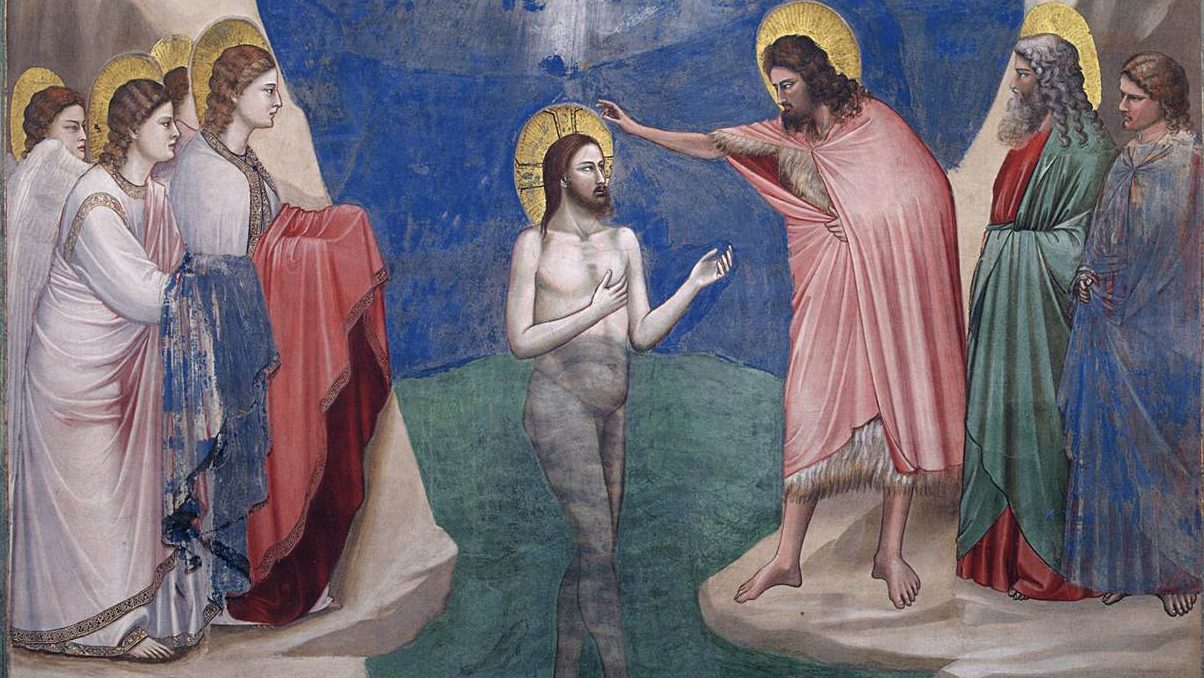God Made Manifest
The Feast of the Baptism of the Lord (B)
Today we celebrate the feast of the Baptism of the Lord in the River Jordan. Today is also the final day of the Christmas season. That fact may come as a surprise for many people who have long ago taken down their tree, packed away their stockings, and put away their manger scenes. Christmas was last month! We are in a new year now! But the Church continues to celebrate the joy of Christmas long after Dec. 25. The feast of Christ’s Nativity only begins the celebration for us. For the Church, the Christmas season includes not only Christmas Day itself but incorporates other important feasts including Epiphany and today’s feast of the Baptism of the Lord.
Why might this be? Associating Epiphany with Christmas makes sense. After all, the magi’s visit is still part of the infancy narratives in the gospels. It naturally flows from the story of Christ’s birth. But the Baptism of the Lord? Christ’s baptism by John the Baptist took place about thirty years after His birth. Christ was a grown man at the time. His baptism marked the beginning of His public ministry. What does that have to do with Christmas?
In last week’s reflection on the Epiphany we talked about the word manifestation. In a way, the whole Christmas season is about Christ manifesting Himself to the world. His manifestation was foreshadowed throughout the Old Testament. The readings of the Advent season, especially from Isaiah, show glimpses of the coming of the Messiah who will save His people and bring us life and light. Christ’s manifestation in the flesh begins with the Annunciation, with Gabriel announcing to Mary that she will bear the Son of God, Jesus, God-with-us (Lk 1:31-35). Already within His mother’s womb, Christ had been made manifest to a few; to His mother, Mary, Joseph, Elizabeth and John the Baptist, who himself leaped in his mother’s womb when the unborn Jesus was near him (Lk 1:44).
But with His birth on that first Christmas, Christ was made manifest on a larger scale. Now God’s presence among us was made known to the shepherds as the angels announced, “to you is born this day in the city of David a Savior, who is Christ the Lord” (Lk 2:11). In all these ways Christ was becoming more and more manifest to the world that He made, and which He came to redeem. As I mentioned last week, the word epiphany means “manifestation,” and so at Epiphany we celebrate Christ made manifest to the magi, wise sages from the east. This is the start of Christ’s manifestation to the gentiles, showing us that His mission of mercy, reconciliation and love is not only for Israel, but for the entire world.
And now the Christmas season ends with the celebration of the Baptism of the Lord. Today we see the beginning of Christ’s public ministry, heralded by the descent of the Holy Spirit and the Father’s own voice proclaiming, “You are my beloved Son; with you I am well pleased” (Mk 1:11). Jesus Christ is proclaimed by the Father Himself to be the Son of God, Emanuel, God-with-us. With this very public proclamation we find confirmation of everything that the angels and prophets have been saying about this Jesus. Truly, He is the Son of God.
While this moment may conclude the manifestation of Christ liturgically in the Christmas season, it is only the beginning of the manifestation of Christ on earth. Christ would continue to manifest Himself in His preaching, His miracles, and ultimately in His suffering, death and resurrection and final ascent into Heaven. But His manifestation does not end with these events, either. His manifestation continues on today in the Church. The Church is the Body of Christ, and through the Church Jesus continues to be made present in the world.
We see this especially in the sacraments, of which the Church is minister. Christ’s glory as the Son of God was made manifest at His baptism and so too is He made manifest to us through our baptism into His life, death, and resurrection. Christ is made manifest to us in the Eucharist, when we receive His Body and Blood. Christ is made manifest to us in the sacrament of Reconciliation wherein His forgiveness and mercy are made present. He is made manifest to us in each of the Sacraments presented through the Church.
But Christ is also made manifest in the world in the individual members of the Church. This means you and I, clergy and laity. Each of us has the potential to make Christ manifest in the world. Indeed, it is the sacred duty of all the baptized to make Christ manifest to others. “Through Baptism the Christian is sacramentally assimilated to Jesus, who in His own baptism anticipates His death and resurrection. The Christian must enter into this mystery of humble self-abasement and repentance, go down into the water with Jesus in order to rise with Him, be reborn of water and the Spirit so as to become the Father’s beloved son in the Son and walk in the newness of life” (Catechism of the Catholic Church).
This is the mission of the baptized Christian: to continue the manifestation of Christ in your life, to live in the Spirit, so that you can reflect the love of the Father to the world. Let us keep this evangelical mission in mind as we begin a new semester, and throughout our lives. And allow me to take this final opportunity to wish you all a Merry Christmas!

